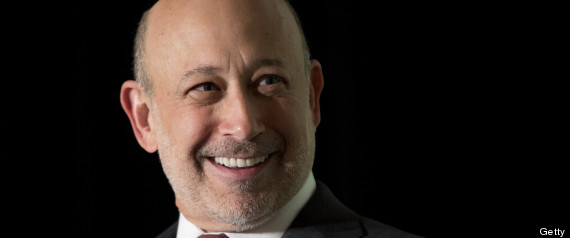It's a Festivus Miracle in July! Banks are somehow making gigatons of money despite onerous new regulations and capital requirements. Why, it's almost like they're not telling the truth when they warn, repeatedly, that these new rules will destroy their profits and the economy.
Goldman Sachs on Tuesday reported second-quarter earnings of $1.86 billion, up 100 percent from a year ago. The high numbers make Goldman the latest big bank to not only survive but thrive in the post-crisis era, when everybody hates banks and is trying to crimp their pay and their risk-taking.
Goldman followed Citigroup (profit up 42 percent to $4.18 billion), JPMorgan Chase (profit up 33 percent to $6.53 billion), and Wells Fargo (profit up 19 percent to $5.5 billion) in reporting second-quarter results that gobsmacked Wall Street forecasters.
It's part of a glaring long-term trend since the crisis. Banks have been repeatedly smashing profit records -- despite a sluggish economy, sluggish deal-making, lower risk-taking and an onslaught of new rules that they complain about endlessly.
Notably, not all of these new bank regulations or capital requirements are in place yet. Regulators have finished less than 40 percent of the new rules required by the Dodd-Frank Act, according to the law firm Davis Polk. Regulators have only recently proposed new requirements that the biggest banks raise more capital and take fewer risks. Banks and their lobbyist legions will have a couple of months to complain about those rules, and they think they're going to be able to loosen the cuffs a bit.
But banks are in many cases already acting as if they are constrained by the new rules. They are taking fewer risks, trimming trading desks and raising more capital. Citigroup, for example, said it had a "leverage ratio" -- the ratio of capital to total assets -- of 4.9 percent in the second quarter, just a tick under the 5 percent required by those terrifying new rules that bank mouthpieces have warned will crush lending. Its plain-vanilla banking unit, which takes secured deposits from customers, had a leverage ratio of 6 percent, matching the new requirements, according to Citigroup. Despite this fact, Citi's profit was -- just as a reminder -- up 42 percent from a year ago.
You'd think Citi, of all banks, would want to shout this news from the rooftops. The bank is just five years removed from a near-death experience during the financial crisis. It has a newish CEO, Michael Corbat, who seems to have done a decent job of settling the bank down after the stormy tenure of recently ousted CEO Vikram Pandit.
And yet Citi and the other big banks have to keep this sort of thing on the down-low. They are the new Big Oil: Making too much money draws too much unwanted attention. If they can handle the rules that have been put in place so far with hardly a hiccup, maybe they can handle even higher capital requirements and new regulations on derivatives and trading. That might be bad for business. But not really all that bad.
Original Article
Source: huffingtonpost.com
Author: Mark Gongloff
Goldman Sachs on Tuesday reported second-quarter earnings of $1.86 billion, up 100 percent from a year ago. The high numbers make Goldman the latest big bank to not only survive but thrive in the post-crisis era, when everybody hates banks and is trying to crimp their pay and their risk-taking.
Goldman followed Citigroup (profit up 42 percent to $4.18 billion), JPMorgan Chase (profit up 33 percent to $6.53 billion), and Wells Fargo (profit up 19 percent to $5.5 billion) in reporting second-quarter results that gobsmacked Wall Street forecasters.
It's part of a glaring long-term trend since the crisis. Banks have been repeatedly smashing profit records -- despite a sluggish economy, sluggish deal-making, lower risk-taking and an onslaught of new rules that they complain about endlessly.
Notably, not all of these new bank regulations or capital requirements are in place yet. Regulators have finished less than 40 percent of the new rules required by the Dodd-Frank Act, according to the law firm Davis Polk. Regulators have only recently proposed new requirements that the biggest banks raise more capital and take fewer risks. Banks and their lobbyist legions will have a couple of months to complain about those rules, and they think they're going to be able to loosen the cuffs a bit.
But banks are in many cases already acting as if they are constrained by the new rules. They are taking fewer risks, trimming trading desks and raising more capital. Citigroup, for example, said it had a "leverage ratio" -- the ratio of capital to total assets -- of 4.9 percent in the second quarter, just a tick under the 5 percent required by those terrifying new rules that bank mouthpieces have warned will crush lending. Its plain-vanilla banking unit, which takes secured deposits from customers, had a leverage ratio of 6 percent, matching the new requirements, according to Citigroup. Despite this fact, Citi's profit was -- just as a reminder -- up 42 percent from a year ago.
You'd think Citi, of all banks, would want to shout this news from the rooftops. The bank is just five years removed from a near-death experience during the financial crisis. It has a newish CEO, Michael Corbat, who seems to have done a decent job of settling the bank down after the stormy tenure of recently ousted CEO Vikram Pandit.
And yet Citi and the other big banks have to keep this sort of thing on the down-low. They are the new Big Oil: Making too much money draws too much unwanted attention. If they can handle the rules that have been put in place so far with hardly a hiccup, maybe they can handle even higher capital requirements and new regulations on derivatives and trading. That might be bad for business. But not really all that bad.
Original Article
Source: huffingtonpost.com
Author: Mark Gongloff

No comments:
Post a Comment